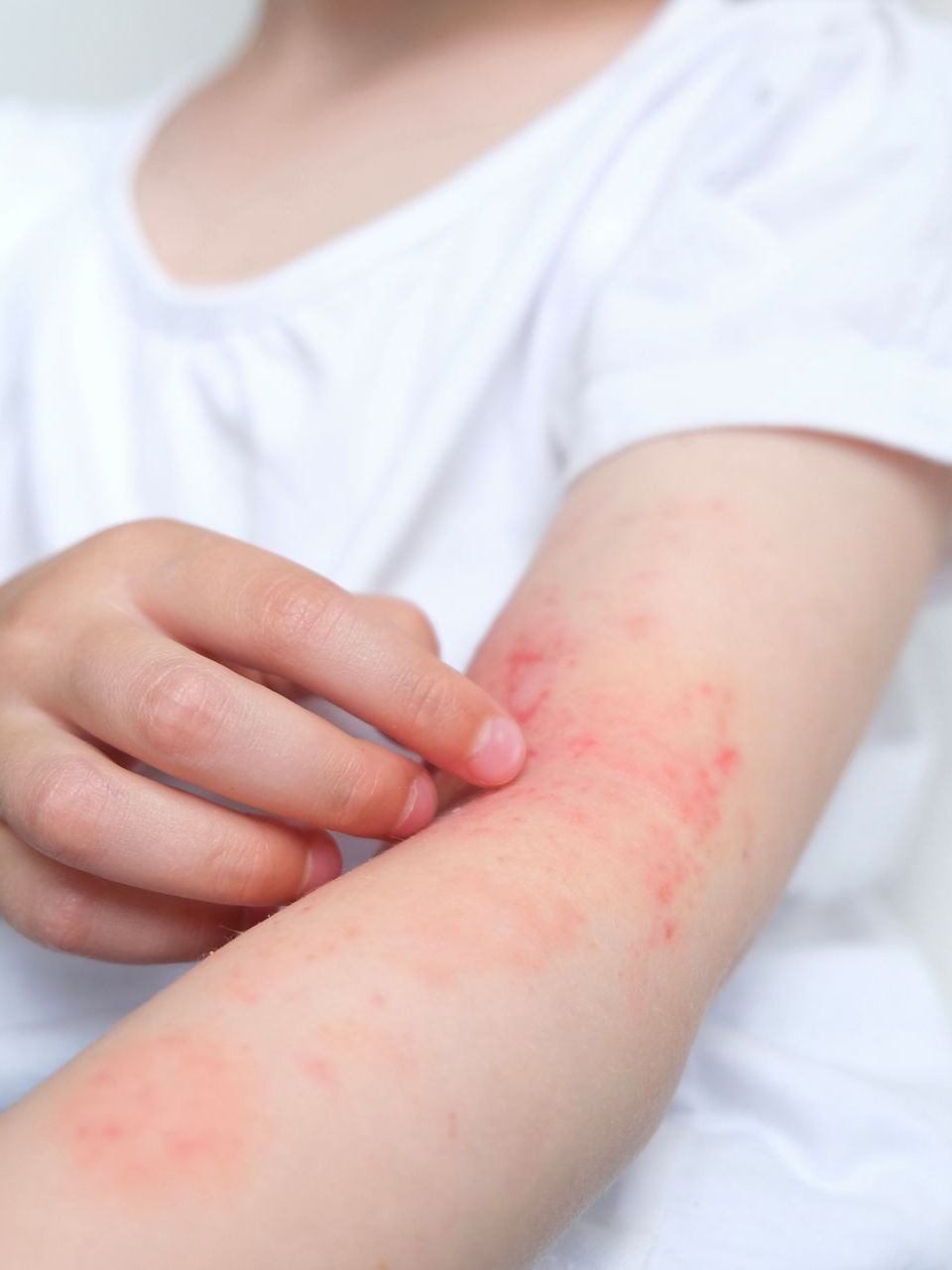Skin Allergies
Eczema and Hive Treatment and Management
Skin allergies, whether they occur independently or in conjunction with seasonal allergies, can be extraordinarily painful for Houston patients, especially if they’re struggling with this allergic reaction on a daily basis. Unlike standard, cold-like seasonal allergy symptoms, skin allergy symptoms aren’t just inconvenient – they’re pervasive, highly visible and, more often than not, distractingly painful.
Common Types of Skin Allergies
Atopic Dermatitis (Eczema)
Atopic dermatitis, or eczema, is a chronic condition characterized by dry, itchy and cracked skin that can bleed and sometimes ooze and crust. Eczema usually manifests in childhood and affects 20 percent of all children. While rare, it can also sometimes occur in adulthood with the presence of triggers.
Triggers can vary from common allergens like pollen and dust mites to irritants like certain soaps, cold and dry weather, long hot showers and stress. Treatment involves using moisturizers and topical steroids to soothe the skin and irritation, as well as avoiding known triggers when possible.
Contact Dermatitis
Contact dermatitis is an allergic reaction that occurs when an allergen comes into contact with skin and creates a physical reaction. There are two types of contact dermatitis: allergic contact dermatitis, which is triggered by an immune response to substances like nickel or poison ivy, and irritant contact dermatitis, which is caused by direct damage from chemicals or physical irritants like detergents.
Symptoms include redness, itchiness, swelling, blisters and dry, cracked skin. Treatment focuses on avoiding triggers, applying topical steroids and using emollients to soothe the skin.
Hives (Urticaria)
Hives, or urticaria, are raised, red bumps, also known as welts, that can appear on the skin suddenly. The primary symptom of hives is a severe itchy sensation. Treatment typically involves antihistamines prescribed by your doctor to reduce itching and swelling, or, in severe cases, using epinephrine, or an EpiPen. If the welts are widespread or if you’re having difficulty breathing, you should call 911.
Although hives and eczema may look and feel similar, they are two separate conditions. Unlike eczema, hives are only a temporary reaction, lasting up to a few weeks at most with a limited risk of recurrence. Hives are also almost exclusively triggered by an allergic reaction to food, pet dander, pollen, latex or certain medications, while eczema is linked to chronic issues with the immune system.
Angioedema
Angioedema is when your skin, particularly around your eyes and lips, begins to swell due to an excess collection of bodily fluids. It typically occurs in conjunction with hives and is common with allergic reactions to foods and medications or as an adverse reaction to bee or fire ant stings. Symptoms include swelling, redness and bodily pain.
In mild cases, you should consult with your doctor, who will usually give you antihistamines and corticosteroids to reduce the swelling. If angioedema occurs around the throat, it can make it difficult to breathe – in which case you should call 911 and likely use an EpiPen.
Psoriasis
Psoriasis is a chronic, genetic skin disease that causes rapid skin cell turnover, leading to rashes that manifest as dandruff-like scaly patches that itch. These can appear anywhere on the body, from your nail beds to your throat, arms, chest and back. While eczema can be triggered by environmental factors, psoriasis usually only flares up as a result of an infection or skin injuries like cuts or burns. Certain medications may also aggravate psoriasis.
In the event of a mild flare-up, your doctor will likely recommend topical treatments in combination with UV light therapy, which helps to slow down cell regeneration. In severe cases with widespread rashes or abnormal pain levels, you may need oral medications or targeted injections to manage your flare-up symptoms.
Risk Factors for Skin Allergies
A family history of skin allergies or allergies in general will elevate your risk of developing skin allergies. Existing allergies can put your immune system into overdrive and make you more susceptible to developing subsequent allergies or experiencing more severe allergic reactions.
Living in an environment that frequently exposes you to allergens you are sensitive to — such as pollen, dust mites, pet dander, mold spores and plants like poison ivy – will also increase your risk. These allergens can also put your skin health at risk, whether the allergic reaction damages your skin or you end up over-washing your hands with harsh soaps. Keeping your skin healthy and moisturized is crucial to limiting your risk of an allergic reaction, or reducing the frequency and severity of flare-ups for individuals with chronic allergy conditions.
Receive a Comprehensive Treatment and Management Plan for Your Skin Allergies in Houston
Without proper management, skin allergies can have a significant impact on your quality of life. Finding a doctor who will develop a personalized treatment plan that effectively alleviates your symptoms is crucial.
At St. Hope Healthcare, our experienced physicians are dedicated to optimizing your skin health and quality of life and will work hard to maximize the efficacy of your allergy symptom management plan. Call us at (713) 778-1300 to schedule your allergy appointment.




